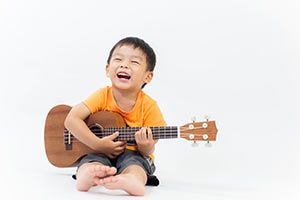
From birth, parents instinctively use music to calm and soothe children, to express their love and joy and to engage and interact. Parents can build on these natural instincts by learning how music can accelerate brain development and improve language, social and reading skills. In fact, learning to play an instrument can improve mathematical learning and even increase SAT scores.
But academic achievement isn’t the only benefit of exposure to music. Music ignites all areas of child development and skills for school readiness: intellectual, social and emotional, motor, language and overall literacy. It helps the body and the mind work together. Exposing children to music during early development helps them learn the sounds and meanings of words. Dancing to music helps children build motor skills while allowing them to practice self-expression. For children and adults, music helps strengthen memory skills.
Infants and Music. Infants recognize the melody of a song long before they understand the words. They often try to mimic sounds and start moving to the music as soon as they are physically able. Quiet, background music can be soothing for infants, especially at sleep time. Loud background music may overstimulate an infant by raising the noise level of the room. Sing simple, short songs to infants in a high, soft voice. Try making up one or two lines about bathing, dressing or eating to sing to them while you do these activities.
Toddlers and Music. Toddlers love to dance and move to music. The key to toddler music is the repetition of songs, which encourages the use of words and memorization. Silly songs make them laugh. Try singing a familiar song and inserting a silly word in the place of the correct word, like “Mary had a little spider” instead of lamb. Let them reproduce rhythms by clapping or tapping objects.
Preschoolers and Music. Preschoolers enjoy singing just to be singing. They aren’t self-conscious about their ability and most are eager to let their voices roar. They like songs that repeat words and melodies, use rhythms with a definite beat and ask them to do things. Preschool children enjoy nursery rhymes and songs about familiar items like toys, animals, play activities, and people. They also like finger plays and nonsense rhymes with or without musical accompaniment.